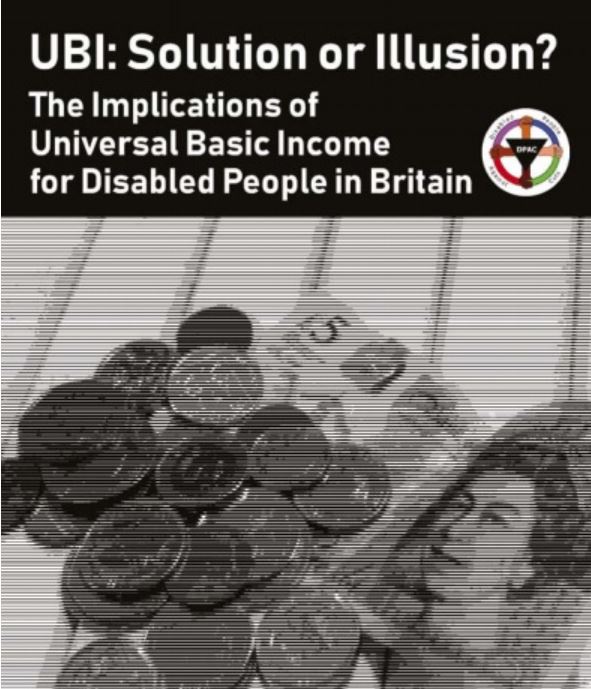
Universal Basic Income is in the news again. Compass has today published a plan by economists Stewart Lansley and Howard Reed to reverse welfare cuts and end poverty, endorsed by Baroness Ruth Lister. We will need to look carefully at the proposals and try to understand them compared to the current welfare system and pay levels (we are claimants, not economists or academics). But we are worried that the Compass plan may limit rather than reinforce women’s case for benefits and undermine established benefits, leaving us with an income of £60 a week for adults, below even JSA or Carers Allowance (page 10). And Compass proposes that UBI be paid to residents who have lived in the UK a certain number of years, but on another page, refers to a payment for British citizens, so it’s worrying too that they exclude immigrant people and asylum seekers who are already excluded from the main benefits system.
The Guardian reports that the plan: ” . . . also calls for the introduction of a 15% income tax band for the lowest-paid workers, while existing income tax rates would rise by 3p in the pound. Child benefit and the state pension would be scrapped, with the UBI rendering it redundant. However, most other elements of the benefits system would remain.”
Plans to replace Child Benefit with general payments can represent a move away from specifically recognising the contribution made by mothers. Read more about the lifeline which Child Benefit has been for women and children, in Selma James‘ article on Eleanor Rathbone and Family Allowance here.
She says: “Unwaged carers alone save the state £132bn a year – the cost of a second NHS in England. A basic income is now widely discussed. If we can consider paying people who are not working, surely we can pay mothers and other carers, women and men, a living wage for the work they do.”

In January, Disabled People Against Cuts (DPAC) published their booklet Universal Basic Income: Solution or Illusion?, warning about the problems of universal basic income (UBI) for disabled people in the UK. They say: “Disabled people have experienced to our detriment through Universal Credit and the personalisation of social care how what can be presented as progressive ideas can in practice effect widespread harm. We must not repeat this mistake through UBI.”
Black Triangle (Scotland) and WinVisible added our concerns, in this Disability News Service report:
“Claire Glasman, from WinVisible, which supports and campaigns for disabled women, said the problem with UBI was that it was not based on need and – like universal credit – did not recognise the importance of unwaged caring work. She said: “We are very worried that it is going to be a way of cutting benefits based on need: the needs of disabled people, the needs of mothers and children, the needs of bereaved people, which specific benefits exist to cover.”
We want to add some more comments to that quote:
- Anti-austerity groups such as Ontario Coalition Against Poverty and activist John Clarke have opposed Universal Basic Income as a plan to cut existing welfare provision and make people pay for services out of their “guaranteed income”. They have also highlighted the racist exclusion of refugee and immigrant people from these guaranteed income schemes, which are restricted to “citizens”. Read more here. (We’ll be adding a blog post soon, about the mixed impact of right-winger Doug Ford scrapping the Ontario pilot, which was depended on by disabled women claimants who mounted a legal challenge.)

- Compare UBI with Universal Credit (UC). The introduction of UC has been used to strip away premiums, especially for disabled adults living alone and disabled children with significant needs.
- For many mothers waiting weeks or months for UC payments, Child Benefit has been the only income the family has to feed the children, as it is not one of the six benefits that UC replaces. (However, Child Benefit is included in the total benefit cap — which punishes single mums and children with high rents who are fleeing domestic violence, disabled or carers, who are unable to go into waged work to escape the cap. Many people don’t claim or are refused disability benefits which exempt you from the benefit cap. People/single mothers on ESA in the work-related activity group are not exempt.)
- There are already major problems with the lack of recognition of unwaged carers. Carers Allowance and Income Support carer premium are low, and benefit is tied to the disabled person’s benefits — which are insecure from being continuously reassessed. In the recent Universal Credit legal challenge by single mum Ms D and her disabled daughter (known as the case of TD and AD), Ms D as a carer did not have any independent right to benefit. When her daughter’s DLA was interrupted, which it should not have been, the family’s Income Support was withheld and Ms D was told to claim Universal Credit, losing £140 a month.

Reblogged this on sdbast.